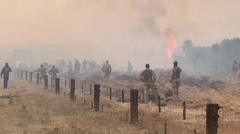Following a legal battle, the U.S. has deported eight men to South Sudan, away from their original countries of origin. This operation, part of the Trump administration's broader deportation efforts, raises questions about legality and human rights amidst ongoing instability in South Sudan.
Eight Deported to South Sudan Amid Legal Controversy Over Immigration Policies

Eight Deported to South Sudan Amid Legal Controversy Over Immigration Policies
The recent deportation of eight individuals, primarily from different nations, highlights the contentious approach of the U.S. government towards immigration and the complexities surrounding third-country deportations.
The U.S. has deported eight individuals to South Sudan, ending a contentious legal standoff that diverted them to Djibouti for weeks prior. The men, who had been convicted of serious offenses such as murder, sexual assault, and robbery, had either completed their prison sentences or were near release. Interestingly, only one man among the eight is originally from South Sudan, while the others hail from Myanmar, Cuba, Vietnam, Laos, and Mexico. U.S. officials revealed that most of these men's home countries were unwilling to accept them.
The Trump administration has intensified its efforts to deport individuals to third-party countries, previously sending people to nations like El Salvador and Costa Rica. Reports have also surfaced regarding potential discussions with countries such as Rwanda, Benin, Angola, and Equatorial Guinea for possible future deportations. A stark image from the Department of Homeland Security depicted the men shackled and escorted by service members on their flight, reflecting the serious nature of these operations.
While specific details on the fate of the deported men in South Sudan remain unclear, the country is currently facing significant instability, teetering on the edge of civil war. The U.S. State Department has even issued travel warnings due to rampant crime and violence, raising concerns about the safety of those deported.
Initially scheduled for removal in May, the situation took a turn when U.S. District Judge Brian Murphy in Massachusetts halted the deportation, ruling that due process must be granted to migrants being sent to third countries. However, the Supreme Court later sided with the Trump administration, overturning Judge Murphy’s ruling and allowing deportations to go forward without the mandated hearings.
Despite appeals from lawyers for relief, they were ultimately dismissed, and Judge Murphy affirmed he had no authority to intervene, citing the Supreme Court's decision as binding. Tricia McLaughlin of the Department of Homeland Security labeled the deportation a triumph over “activist judges.” Earlier this year, Secretary of State Marco Rubio had also revoked visas for those with South Sudanese passports, emphasizing a trend of stringent immigration policies that focus on the complexities of repatriation and safety.
The Trump administration has intensified its efforts to deport individuals to third-party countries, previously sending people to nations like El Salvador and Costa Rica. Reports have also surfaced regarding potential discussions with countries such as Rwanda, Benin, Angola, and Equatorial Guinea for possible future deportations. A stark image from the Department of Homeland Security depicted the men shackled and escorted by service members on their flight, reflecting the serious nature of these operations.
While specific details on the fate of the deported men in South Sudan remain unclear, the country is currently facing significant instability, teetering on the edge of civil war. The U.S. State Department has even issued travel warnings due to rampant crime and violence, raising concerns about the safety of those deported.
Initially scheduled for removal in May, the situation took a turn when U.S. District Judge Brian Murphy in Massachusetts halted the deportation, ruling that due process must be granted to migrants being sent to third countries. However, the Supreme Court later sided with the Trump administration, overturning Judge Murphy’s ruling and allowing deportations to go forward without the mandated hearings.
Despite appeals from lawyers for relief, they were ultimately dismissed, and Judge Murphy affirmed he had no authority to intervene, citing the Supreme Court's decision as binding. Tricia McLaughlin of the Department of Homeland Security labeled the deportation a triumph over “activist judges.” Earlier this year, Secretary of State Marco Rubio had also revoked visas for those with South Sudanese passports, emphasizing a trend of stringent immigration policies that focus on the complexities of repatriation and safety.



















